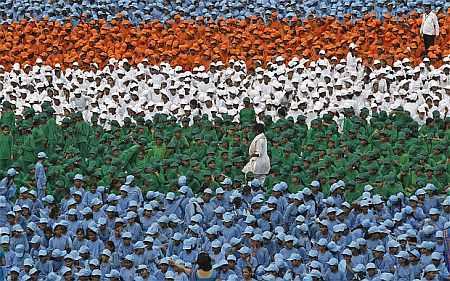Photographs: Rupak De Chowdhuri/Reuters Rajni Bakshi
At a time when there is wide spread lament about India's slipping rate of economic growth a concept like 'degrowth' might seem ridiculous, writes Rajni Bakshi
Gandhi Jayanti has become a day to be ignored.
Whether it is the avalanche of corruption or economic and environmental crises -- remembering Gandhi seems just too painful.
That is because the ideals Gandhi represented and lived seem to recede further and further out of reach.
However, as usual, there is more than meets the eye in headline news.
One signal of the sub-surface struggle for building a new world was manifest at the Degrowth conference held at Venince from September 19 to 23.
. . .
Degrowth and Gandhian inspiration
Image: Workers hold iron rods at a construction site of a bridge on the river Tawi in Jammu.Photographs: Mukesh Gupta/Reuters
At a time when there is wide spread lament about India's slipping rate of economic growth a concept like 'degrowth' might seem ridiculous.
This seems even more true for parts of Europe where unemployment is so high it reminds people of the Great Depression.
So why should we pay attention to a bunch of academics and activists who are promoting a negative sounding concept like 'Degrowth'?
The theme of this year's conference offers a clue -- 'Great Transition: degrowth as a passage of civilisation'.
Just what this transition could lead to was described through a scenario presented by Veronika Bennholdt-Thomsen of the University of Natural Resources and Life Sciences in Vienna.
. . .
Degrowth and Gandhian inspiration
Image: A worker of a food superstore arranges price tags of the products inside a mall in the western Indian city of Ahmedabad.Photographs: Amit Dave/Reuters
Imagine, she said, that it is the year 2099 and people are happy because they live in a time of peace: "There is no famine, no war. . . . People now live in small cities and village surrounded by vegetable gardens, flowers, woods, which are owned by communities.
"Fountains, lakes and rivers are treated like revered grannies. . . . The main economy is people making gifts."
But how do can this magical scenario be realised?
For most of the speakers and participants at the conference in Venice the key lies to challenging an intellectual culture that puts economics and ever increasing consumption at the center of life.
As a counter to this 'Degrowthers' are in favor of an economics of subsistence.
. . .
Degrowth and Gandhian inspiration
Image: Farmers transport wheat crop on camels at Pipalgaon village on the outskirts of Allahabad.Photographs: Jitendra Prakash/Reuters
That means eliminating "the idea that we get all we need to live well from a consumer society. Subsistence is not 'under-development' according to Bennholdt-Thomsen.
Instead it means asking what we need to live well instead of always seeking more goods. In this line of thinking the main center of creativity is civil society, not governments or corporations.
Even a few years ago such ideas were rejected out right in Europe, where people thought that 'subsistence' is what people are condemned to in the third world.
But this is gradually changing and as the economic crisis in Europe deepens there is more interest in what once seemed like wild and radical ideas.
. . .
Degrowth and Gandhian inspiration
Photographs: Reuters
Among other speakers who were reported on the conference's website, is Serge Latouche, Professor Emeritus of Economics at Universite d'Orsay, France.
Latouche called for rejecting both austerity and growth.
This can be done partly by reverting to organic farming and non-fossil sources of energy.
"We need also to cut working times, working less to live better and to have more time to dream and to live" Latouche was reported as saying.
He went on to acknowledge that all this is easier said than done, but added: "When we reach the bottom of this current crisis, the things that at the moment seem like a Utopia will in fact seem very realistic."
. . .
Degrowth and Gandhian inspiration
Photographs: Reuters
Helena Norberg Hodge, founder of the International Society for Ecology and Culture, equated Degrowth with 'Economics of Happiness'. Globalization, said Hodge, has been a process of removing the rules that protected society from big business -- 'The EU exists to serve the needs of big business and to reduce diversity.'
Hodge has been a passionate proponent of 'localism' as a way of fostering more equitable and sustainable economic structures: "If tomorrow, people sat down to a breakfast produced entirely in their region, no money would flow to corporations, but lots would flow to local farmers and growers, and we would have clean, safe, healthy food. (at present) Organic food is more expensive because of the way subsidies skew the system towards industrial agriculture."
Taking pains to emphasise that 'localism' is not about ending trade or tourism Hodge argues that it is about decommercialization and rebuilding relationships between producers and consumers.
. . .
Degrowth and Gandhian inspiration
Photographs: Reuters
To some extent this is already happening through the work of urban farmers, community supported agriculture and other forms of promoting local foods.
"What we need to do is to bring the economy home.
"We also need local business alliances, where local businesses link up to support each other.
"What we need to grow is the number of businesses, not the size of them. While industrial production of rubber balls makes sense, for apples it does not." says Hodge.
When Hodge and other activists first advocated these ideas two decades ago they were dismissed as radical fringe elements.
. . .
Degrowth and Gandhian inspiration
Photographs: Ajay Verma/Reuters
Today the mainstream media, including the New York Times, has been carrying reports on 'localising the future'.
Time magazine has reported the rise of 'locanomics' – which is partly being pushed by steep hikes in the price of oil and of rising costs of labor in China.
Transition initiatives are now underway in parts of Europe and the USA. Some of these are still micro initiatives like eco-villages promoting subsistence economies and others have become more pervasive with the spread of local food and farmers markets.
Votaries of Degrowth are accustomed to being dismissed because none of this matches conventional concepts of radical politics.
What does local food have to do with macro economic change? The answer is that any forms of social and economic activity which enable people to act in more holistic manner as members of communities, rather than as just buyers and sellers, will help facilitate the transition to new possibilities.
. . .
Degrowth and Gandhian inspiration
Image: An employee holds a gold piece, each weighing 100 grams, at the state-owned mining company PT Antam Tbk metal refinery in Jakarta, Indonesia.Photographs: Beawiharta Beawiharta/Reuters
In essence the prevailing 'Growth' ethos is a mono-culture in economic thinking.
The 'Degrowthers' are people who are pushing for a wider range of ideas, concepts and alternative futures to be given greater consideration.
This is why many of them find inspiration in Gandhi's emphasise on empowering local economies and small producers in communities that are self-reliant for all the essential needs of life.
Clearly this kind of thinking will need to be developed and refined much more -- in order to take on the anomalies generated by conventional economics.
This series of Degrowth conferences, held every two years, is an early sign of struggles for alternative futures.
There is a long, hard road ahead for those who wish to see these ideas and ideals become reality on a global scale.










article